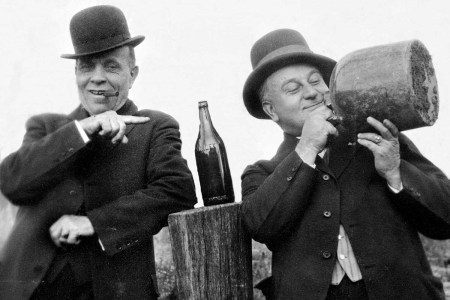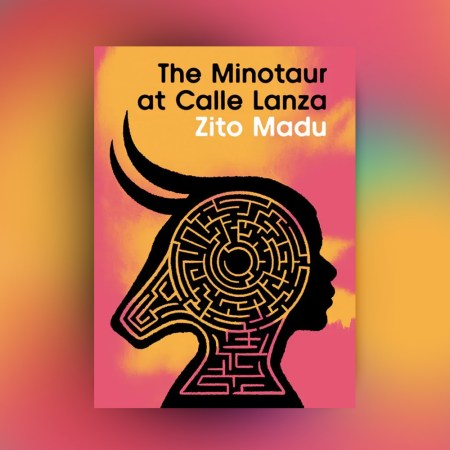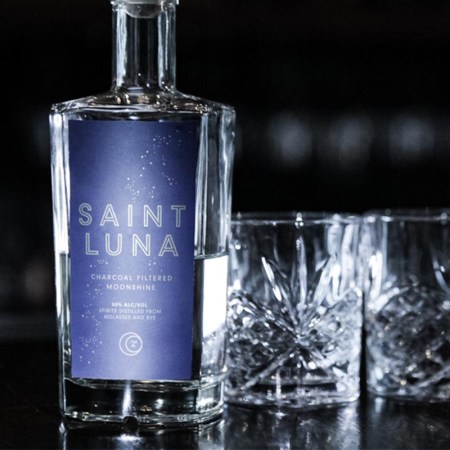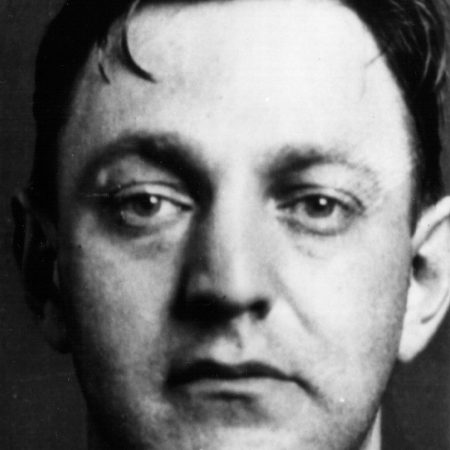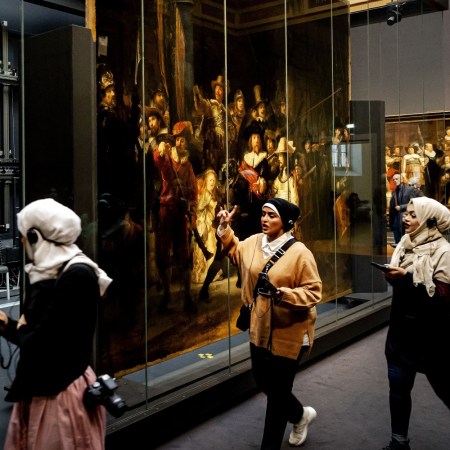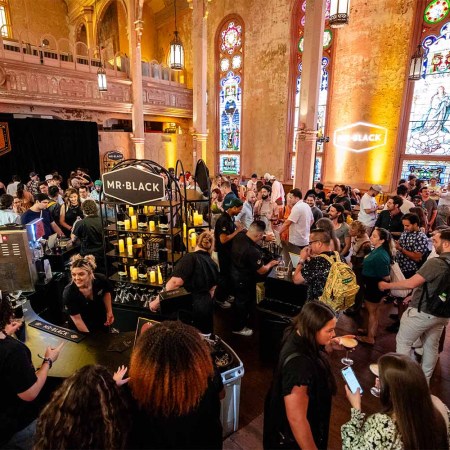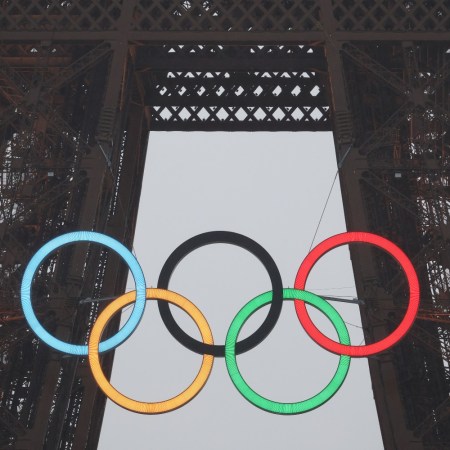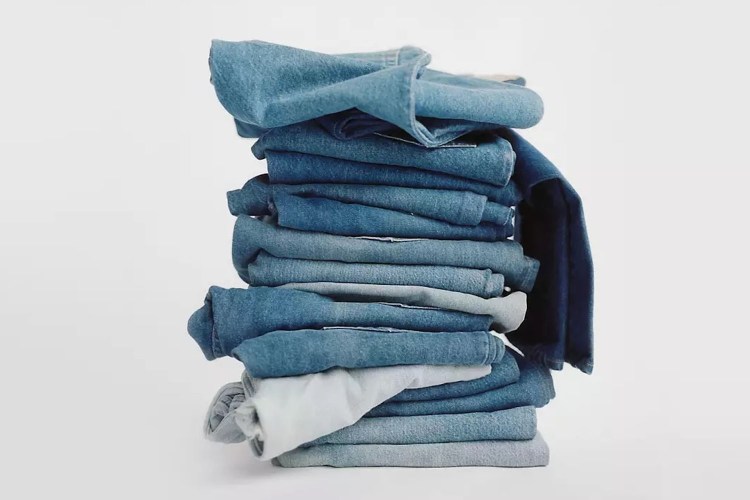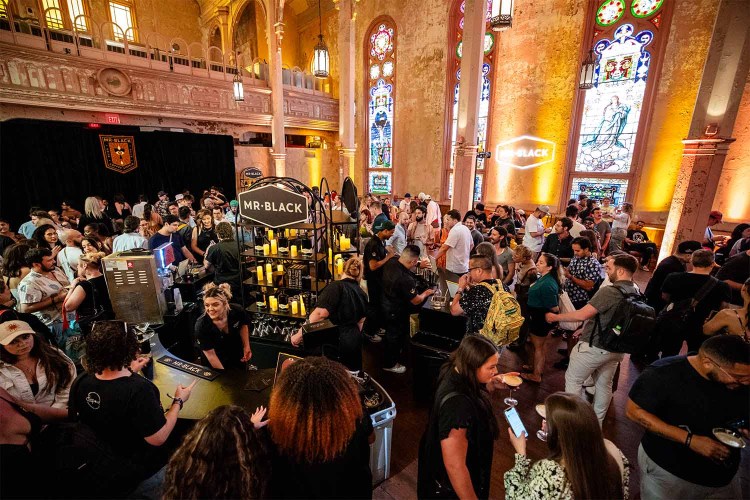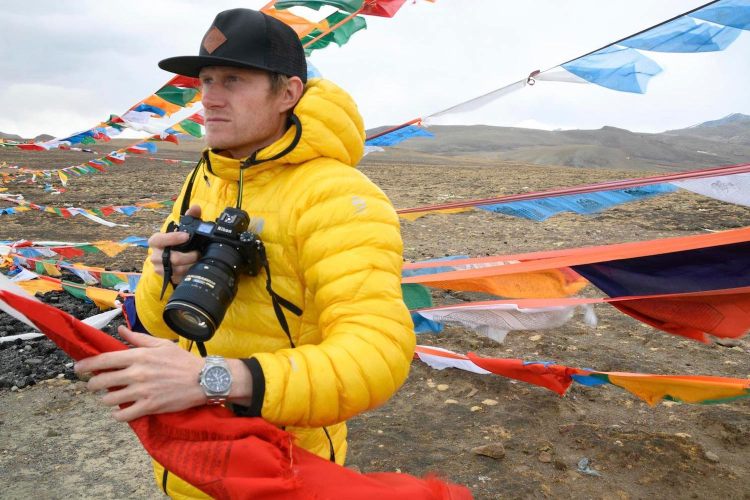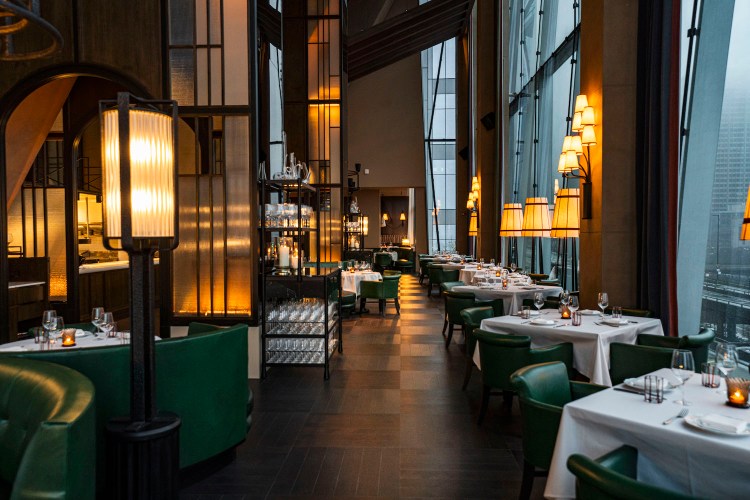The hunt for illicit moonshine can make for a pretty compelling story. First published in 1985, longtime The New Yorker writer Alec Wilkinson’s Moonshine: A Life in Pursuit of White Liquor chronicles the author’s time riding shotgun as Garland Bunting, the Alcoholic Beverage Control officer for North Carolina’s Halifax County, goes about his daily work. Bunting is a fascinating subject, and the small details that Wilkinson describes make for a thoroughly immersive read. The book also abounds with fascinating — and occasionally visceral — details about the makings of illegal spirits.
Wilkinson’s book was a big deal upon its release; in an afterword to this new edition, he recalls Bunting appearing on The Late Show With David Letterman in the aftermath of the book’s publication. When InsideHook chatted with Wilkinson about the new edition of his book, we learned plenty of details of his time with Bunting, their eventual falling-out and what the film Bull Durham has to do with it all.
InsideHook: What was the process like as far as bringing out this new edition of Moonshine? How long has the new edition been in the works?
Alec Wilkinson: [Publisher Godine] started talking to me before the Nonpareil series existed. They had a new editorial director, and my impression is they were trying to figure out what they were going to do. We started talking a while ago, long enough ago that my first response when they got in touch with me was, “Let’s see if this really works out.” People tell you all the time, “I wish I could publish you,” or something like that, and you never hear from them again. Well, not all the time — that’s an exaggeration — but I have had people say things like that to me before, and I just thought, “Well, let’s see what happens.”
How did you first get connected to Garland Bunting? And when did you realize that this was something that could become a book?
It began as my first profile at The New Yorker, and William Shawn, who was the editor of The New Yorker, believed that people are more difficult to write about than events because it’s not easy to dramatize people. I hadn’t yet done anything except write stories for Talk of the Town, which were, in those days, anonymous. I had heard about Garland Bunting; I’d read about him. In order to overcome Shawn’s reluctance to let a young writer do a profile as his first piece of signed writing, I presented it to him as a piece of reporting about the reappearance in the South, because of the recession, of cheap liquor in the form of moonshine — and that somebody who might be interesting to write about it from the point of view of was this man who chased moonshiners.
I called Garland up and made an appointment to go see him, and I bought a ticket. As I remember, it cost $19.00 to fly from New York City to Raleigh, North Carolina on People Express. It hadn’t yet occurred to me, because I was so young, that the whole point is to fly as fancy as you can and stay and eat as fancy as you can when you’re traveling on The New Yorker. So I did everything on the cheap.
I loved the detail that Garland Bunting had been hesitant at first about how much you could see him. And that after you got to know him better, he mentioned that he was a little worried that you were possibly a hitman who had been sent on his trail.
What happened was, I stayed in the wrong town. He had told me to stay either in Rocky Mount or Roanoke Rapids, but I switched them and I stayed in the wrong town. So I was calling him from the wrong place, but I couldn’t get him to show up to meet me when he said he would. He finally arrived in the early evening, maybe after dinner even, and said we could go out and ride around a little bit. And he took me out on a rambling little tour of various high points of Eastern North Carolina life.
When he saw that I was writing down everything he was saying and approaching things from a fairly obvious point of view of someone collecting information, he confessed to me that he had thought that the only reason he might be getting a call from someone in New York City was that somehow somebody he’d arrested had been part of a larger liquor syndicate that he’d now inconvenienced, and they were sending a hitman from New York to take care of him.
I was probably a pretty unlikely candidate, by means of my appearance, for a hitman. And he unbent a little then. He was rather formal with me, but once he satisfied his mind on that subject, he was much more welcoming.
Is that the only time you have been mistaken for a hitman while on assignment?
I believe it is. Usually I’m taken for a priest. I’m earnest, I guess.
When I hear about moonshine, especially illegal moonshine, I tend to think of a home operation. But in the book, Garland Bunting mentioned that he had encountered full-on industrial operations making moonshine. How big of a thing was illegal moonshine at the time that you were writing this?
I think historically it had been a bigger thing in the decades before I arrived in North Carolina than it was at those times itself. I don’t know. Several things had happened. I think a lot of people who would have drunk moonshine liquor in, say, the ’50s and maybe even the early ’60s had switched over to smoking pot and maybe even dealing in things like amphetamines. I think the customer base had probably been eroded.
There were ATF figures and things like that. And there was more moonshine being caught in terms of being produced, in terms of what they were catching, than had been in the previous, say, 10 years. It did seem to be a result of the recession, and people being just as content to drink white liquor as they were to drink red liquor and pay extra money.
One of the details that really stuck with me was that there were some bars that would start out serving legal whiskey to their customers, and then, once they’d gotten drunk, would switch them over to moonshine.
That was a surprise to me, because I would have gone down there with the impression that all people in the North probably had, which is that there was no finer whiskey to be had than artisanally made moonshine.
The surprise to me was to find out it was the next thing to rat poison. You could drink Sterno, probably, and almost do less damage to your body than you might do by a lot of white liquor.
Some of the details in there definitely point to that, like the stills that had the bodies of dogs and things like that to discourage anyone from trespassing.
I got from Garland, finally, some white liquor that he had confiscated and I brought it back to New York with me. It was in a mason jar and I never touched it. I thought it was going to be a fun thing to bring out at a dinner party or something: “Here’s some! Absolutely genuine.” But once I became educated about what was actually in it, I just never opened it. I might have let people sniff it or something like that, but yeah, I never tasted it.
And the detail about moonshiners using chicken feed as the mash was also a little head-spinning.
And of course it makes perfect sense. It’s why people die of heroin overdoses all the time, because some unscrupulous drug dealer has polluted his product. Obviously, the cheaper you could make it, the bigger you profit.
In the years since Moonshine was first published, I can now go to a reasonably nice liquor store and go and buy something that may be billed as moonshine or white whiskey, and is legitimately good. Was it strange seeing moonshine become an artisanal product in certain circles?
You know, I wasn’t aware that it had. I was being ironic when I said that people in the North had this idea that this was a carefully crafted product that grandpa made out back out in the woods. You know: “Go get the finest bourbon that could be had and it wouldn’t be a patch on grandpa’s moonshine.”
It’s like all the legends that grow up about criminals of all kinds. The idea of the Mafia man who’s so smart that he out-thinks the FBI and the cops on all fronts. When I lived in Little Italy, I saw the Gambino family and these other mobsters and they were dumb as bricks, but they were scary as hell. So no cases could be built against them because they would carry out some kind of criminal activity and anybody who saw them do it or had been around or was aware of it knew that it was worth his or her life if he said anything.
These things are apocryphal, the beautiful sipping moonshine, the you know, the mafioso too smart to be apprehended. I live in the Hudson Valley and there’s even a pretty well-regarded distillery I’m aware of in the Hudson Valley that makes whiskey. I’m not surprised to hear there’s artisanal sorts of things, but I wasn’t aware of it and I didn’t know about it.
There has to be a disconnect in the sense that you can’t make something patiently craftsman out of the ingredients that these people were using for moonshine. Just as you could make craft beer in your basement, I suppose you could use fine ingredients to craft homemade whiskey.
While you were researching the book, you met a couple of the people who Garland Bunting had arrested. Were the bootleggers who he was dealing with mostly going to prison? Were they being fined? Or did it depend on the severity of the operation?
The ones I met were men who were supplementing their incomes. Farmers who’d had a bad year, who needed money to cover their expenses and that sort of thing. I don’t think anybody like that’s going to go to jail. I think the really big bootleggers were too hard to catch. They were just like drug dealers. You could catch the men operating their stills, but that they weren’t going to give up the big man and and the big man was going to pay their way when they were in jail and things like that.
The biggest of them all that I was aware of was a man named Percy Flowers. One of the agents told me he had a very nice house somewhere, in Rocky Mountain or something like that. He used to boast that there wasn’t a brick in it that liquor hadn’t paid for. Do you know who Joseph Mitchell was?
Yes.
So you know, I was going to Joseph Mitchell’s home ground to write about this. And Joe was very Southern and very elegant. I came back from one of the trips to North Carolina having found out about Percy Flowers. I went to Joe and I told him about it. He said, “Well, he’s a kind of hero to me.”
I wrote about Percy Flowers, but William Maxwell told me I had to take it out because Mitchell had told him about Percy Flowers and his intention to write about him as a childhood hero. And Maxwell said, “You have to take this out. This is Mitchell’s material, not yours.” He said it in a kindly way, but he meant, “You can’t do this.” So the part about Percy Flowers came out.
But Percy Flowers was a big deal. And just like they always talk about gangsters in New York, he was the number one contributor to the local church fair and the local school fair and things like that. Making everybody feel that he was the patron, and living a life of some kind of local grandeur, with a nice Cadillac and stuff like that. And I don’t think he ever got caught.
He was dead by the time I got there. But I remember getting his obituary and so on. Everybody knew that he was the biggest bootlegger in the area. Nobody had ever been able to catch him. In order to catch him, you’d have to be able to go in there with a story about how you wanted to buy tens of thousands of dollars worth of a shipment to send it here or there. You couldn’t go in just saying, like Garland would, “I need a pint to see through the game and I’ll be back at two o’clock in the morning to get some more.”
As you readied this new edition of the book, was there anything in it that you thought about editing or revising?
I always expect that. This is, maybe, the third edition of Moonshine that I can think of. And I always think I’m going to go back and rewrite it and get as good as I can make it, because it’s a student book. And somehow these things — I don’t know how it is for other writers — for me, it’s as if they were sort of encased in amber.
I wonder if it’s because one is simply no longer the person one was when one wrote that book. I can’t really recover that. It would almost have to be an entirely different book, I couldn’t go through it and revise it in the sense of making things clearer or more apprehensible or more dramatic. It’s just over and done.
I think it’s interesting with writers. I don’t know how familiar you are with William Maxwell’s novels, but he wrote So Long, See You Tomorrow, his masterpiece, when he was 68 years old, and yet another of his great books is They Came Like Swallows, which was written when he was 28. You read both of them and you can tell that they’re by the same person, but a great deal has gone on in the life of that person in those 40 years that intervened.
Moonshine came out almost 40 years ago. I just can’t recover the person that I was or connect myself somehow with the idea that I would be excited by the idea of trying to rewrite that book. It’s a very interesting question, but the answer to it is never the one I expected to be. It’s just kind of, “Okay. That’s what you did.”
It’s Time to Give Moonshine Some Respect
It’s an American tradition and as worthy a liquid as any unaged spiritDid you stay in touch with Garland Bunting after the book came out?
Well, I don’t know how much you want to know about this, but “No” is the answer. I fell out with Garland because for a number of reasons. Mostly because he thought that I got rich from writing about him. There was a well-established Hollywood producer whose name was Martin Poll, and he was building a film studio in North Carolina and a couple of — I suppose — enterprising aspirant producers in Hollywood got the idea that Moonshine would be a great movie idea.
They went to Garland and tried to cut me out of it. They got a lawyer for Garland, and my agent was a very powerful woman named Amanda Urban. I said, you know, “My book’s being stolen. I need to do this.”
She said, “If you think I’m going to take on Martin Poll to protect you, you’re mistaken.” Strike one in my eventual firing of Amanda Urban. It was sort of wonderful. There were these legal back and forths. I then fired Amanda Urban and I took up with Andrew Wiley, and Andrew Wiley was in those days getting things underway — and he loved nothing better than to attack someone. He went after Martin Poll gleefully.
The outcome was a series of exchanges with letters of lawyers, with the final one being that Garland Bunting was a famous man, and famous people are allowed to do whatever they want with their life rights. They’re not obliged to anyone. And proof that Garland Bunting was famous was that he had been the subject of a profile in The New Yorker.
Oh my god.
And that was that.
I don’t know if you are aware of Garland’s movie career?
No.
Oh, so these young producers somehow got Garland in touch with Ron Shelton, and Ron Shelton was making Bull Durham. And if you watch Bull Durham, the announcer for the local baseball team that Tim Robbins pitches for and that Susan Sarandon follows is Garland Bunting. He’s the one who sits in the booth and narrates the game. He’s got a few scenes. Ron Shelton became a big supporter of Garland and all these people. Garland’s also in another Ron Shelton movie called Blaze. They all formed this wall around Garland and Garland was very happy with them. And he made a lot of money from that, to such an extent that when Garland died, Ron Shelton was the speaker at his funeral.
Maybe a month later, Colleen — his wife — called me and said, “By the way, Garland died a while ago.” So we fell out completely.
It took me a long time to write Moonshine. Longer than it should have. But I was a young guy, unconfident, really daunted by the idea of writing my first piece for William Shawn. It took a long time. And in that time, I don’t think I got a haircut. I let my hair grow. So by the time Garland came to New York to be on The Today Show and promote the book and so on, you know, I had hair down to here. He was really taken aback when he saw me. He said, “If he’d showed up like that in North Carolina, I’d put him on a fast train home.”
I think Garland also thought, “What do you know? I got conned by this guy. He’s a hippie.” And so he felt entirely entitled to con me back, I suppose. But, you know, I was sorry about it. We were friends — and then we weren’t friends. It’s an old story.
I haven’t had another case like that. Things have come close. Movies are always a big problem. Book publishing is such a tiny amount of money involved, unless you’re Sebastian Junger or something like that. People make money on movies that never get made. Just talking about projects and having lunches and all sorts of things and paying screenwriters to do scripts and stuff like that. It’s very easy for it to corrupt.
After Garland, anytime I got a movie deal, I always gave half the money to the subject and took half for myself so that there was just never any question of who’s getting the benefit. Movie money, if you’re a writer, is essentially money dropping on you from the sky. It would be wrong to keep it all for yourself. So that’s what prevented me from having any further problems with people. But I learned that lesson with Garland. I was innocent about it.
I had a friend, a novelist named Reynolds Price, who was from Raleigh. Reynolds said to me once, “If you were from down here, you would have known Garland would do that to you.” Not double-cross me, but if given a reason to double-cross me, as he felt he had been, that he would. And I never saw the double-cross coming. It was the first time that it happened to me.
I sold the movie rights to [Wilkinson’s first book] Midnights for way, way, way, way, way, way, way more than I ever got out of the book. And I didn’t know that you could have your ideas taken from you. Somebody could just come along and say, “Oh, I like this idea. It’s mine now.”
I never went to the funeral. But if you’ve read the afterword that I wrote for this edition, you know he was a gift from life for me and I’m grateful for him. I understand why he did what he did. It would have looked to him — coming to New York City and being wined and dined and given helicopter tours and things like that — like the lesson here is there’s a lot of money and it all went to the writer. And, of course, he was wrong. I think I was given, as an advance for that book, $6,500. I think my advance for Midnights was $6,000 and they wanted to give me a raise for the next one. I’m very happy that I got to write my books, but they were basically all in the shadow of The New Yorker.
Join America's Fastest Growing Spirits Newsletter THE SPILL. Unlock all the reviews, recipes and revelry — and get 15% off award-winning La Tierra de Acre Mezcal.

